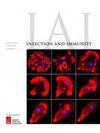治疗性聚糖特异性抗体结合可在原发性阿米巴脑膜脑炎期间起到保护作用。
摘要
弓形虫(Naegleria fowleri,N. fowleri)通过上呼吸道感染会引起一种致命的中枢神经系统疾病,即原发性阿米巴脑膜脑炎(PAM)。对 N. fowleri 感染的强大体内免疫反应是这种疾病的免疫病理学特征的基础。然而,人们对这种病原体逃避免疫控制的原因知之甚少。感染发生在看似健康的人身上,而且缺乏有效的临床选择,因此死亡率接近 98%。目前还不清楚宿主因素如何或是否会导致易感性或疾病恶化,但由于缺乏工具,对体内免疫反应和疾病进展的机理研究受到阻碍。在这项研究中,我们生成了针对鲍勒氏菌表面抗原的单克隆抗体,并证明它们是研究体内免疫反应的绝佳工具。我们还发现了一种在体外具有强大内在抗阿米巴痢疾活性的单克隆,即 2B6。这种抗体还能通过治疗延长宿主在体内的存活时间,此外,具有更能引导免疫效应活性的同种型重组抗体在治疗时还能进一步提高存活率。因此,我们报告了一种新型禽流感单克隆抗体的产生,这种抗体即使在疾病期间进行治疗,也能增强有益的免疫功能。我们认为这为治疗性抗体疗法在 PAM 中的潜力提供了证据。重要意义鲍勒氏阿米巴原虫(N. fowleri)是一种自由生活的阿米巴原虫,广泛存在于温暖的淡水中。虽然人类接触这种阿米巴虫很常见,但很少会导致发病。然而,当 N. fowleri 进入上呼吸道,特别是嗅觉粘膜时,感染会导致一种致命的疾病,即原发性阿米巴脑膜脑炎(PAM)。作为一种自由生活的阿米巴,N. fowleri 不需要哺乳动物宿主;事实上,它可以被准确地描述为一种意外的机会性病原体。虽然大多数机会性感染都发生在免疫力低下的人类身上,但目前还没有与 N. fowleri 感染相关的免疫功能障碍的报道。因此,N. fowleri 机会性感染的基础尚不清楚,一些人感染 PAM 而另一些人没有感染的原因也不甚了解。我们有理由推测,局部或急性免疫失败,甚至可能是缺乏先前的适应性免疫,与疾病易感性有关。为了了解哪些宿主因素对防御至关重要,以及这些反应如何可能受到损害,从而导致致命感染,迫切需要对哺乳动物宿主体内对福氏线虫的免疫反应进行仔细的免疫分析和特征描述。为了确定能抵抗体内 N. fowleri 感染的基因和途径,我们生成了表面活性单克隆抗体(Abs),这种抗体能在体内快速检测和定量阿米巴。有趣的是,在人类和动物的血清和唾液中很容易检测到与 N. fowleri 结合的抗体,这表明非致命性接触会产生针对阿米巴的体液免疫反应。然而,Abs 在体内如何与 Naegleria 相互作用,或如何有助于预防致命感染,目前还不十分清楚。在这项研究中,我们生成并鉴定了一种单克隆抗体(Ab)--克隆 2B6,它能识别体外培养的奈氏阿米巴虫和小鼠传代奈氏阿米巴虫的糖基化表面抗原。当克隆 2B6 与 N. fowleri 结合时,它会抑制变形虫的运动和摄食行为,从而导致强烈的生长抑制。用 Ab 对小鼠进行全身和脑内治疗后,小鼠的发病时间推迟,存活时间延长。此外,我们还发现,通过抗体同种型增强免疫导向效应活性可进一步提高存活率,而不会产生明显的免疫致病副作用。这些研究结果表明,抗体治疗有可能成为目前帕金森病治疗方法之外的另一种治疗方法。Naegleria fowleri (N. fowleri) infection via the upper respiratory tract causes a fatal CNS disease known as primary amoebic meningoencephalitis (PAM). The robust in vivo immune response to N. fowleri infection underlies the immunopathology that characterizes the disease. However, little is known about why this pathogen evades immune control. Infections occur in seemingly healthy individuals and effective clinical options are lacking, thus a nearly 98% fatality rate. It is unclear how or if host factors may contribute to susceptibility or disease exacerbation, yet mechanistic studies of the in vivo immune response and disease progression are hampered by a lack of tools. In this study, we have generated monoclonal antibodies to N. fowleri surface antigens and shown them to be excellent tools for studying the in vivo immune response. We also identified one monoclonal, 2B6, with potent inherent anti-amoebastatic activity in vitro. This antibody is also able to therapeutically prolong host survival in vivo and furthermore, recombinant antibodies with an isotype more capable of directing immune effector activity further improved survival when given therapeutically. Thus, we report the generation of a novel monoclonal antibody to N. fowleri that can enhance beneficial immune functions, even when given therapeutically during disease. We believe this provides evidence for the potential of therapeutic antibody treatments in PAM.IMPORTANCENaegleria fowleri (N. fowleri) is a free-living amoeba that is found ubiquitously in warm freshwater. While human exposure is common, it rarely results in pathogenesis. However, when N. fowleri gains access to the upper airway, specifically the olfactory mucosa, infection leads to a lethal disease known as primary amoebic meningoencephalitis (PAM). As a free-living amoeba, N. fowleri does not need a mammalian host; indeed, it can be accurately described as an accidental opportunistic pathogen. While most opportunistic infections occur in humans who are immunocompromised, there are no reported immune dysfunctions associated with N. fowleri infection. Therefore, the basis for N. fowleri opportunism is not known, and the reasons why some humans develop PAM while others do not are simply not well understood. It is reasonable to speculate that local or acute immune failures, potentially even a lack of prior adaptive immunity, are related to disease susceptibility. Careful immune profiling and characterization of the in vivo immune response to N. fowleri in a mammalian host are desperately needed to understand which host factors are critical to defense, and how these responses might be compromised in a way that results in lethal infection. To identify genes and pathways that provide resistance against in vivo N. fowleri infection, we generated surface reactive monoclonal antibodies (Abs) that provide rapid amoeba detection and quantification in vivo. Interestingly, N. fowleri binding Abs have been readily detected in the serum and saliva of humans and animals suggesting that non-lethal exposure drives a humoral immune response against the amoeba. Yet, how Abs might interact with Naegleria in vivo or contribute to preventing lethal infection is not well understood. In this study, we have generated and characterized a monoclonal antibody (Ab), Clone 2B6, that recognizes a glycosylated surface antigen present in cultured in vitro N. fowleri as well as mouse passaged N. fowleri. When clone 2B6 binds to N. fowleri, it inhibits amoeba motility and feeding behavior, leading to strong growth inhibition. Mice treated systemically and intracerebrally with Ab displayed a delayed disease onset and prolonged survival. In addition, we found that enhancing immune-directed effector activity via antibody isotype could further enhance survival without obvious immunopathogenic side effects. These findings show the potential for antibody treatment as an additional therapeutic to those used currently in PAM.

 求助内容:
求助内容: 应助结果提醒方式:
应助结果提醒方式:


